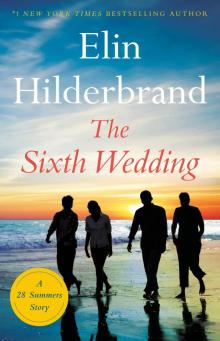- Home
- Elin Hilderbrand
Summer of '79: A Summer of '69 Story Page 4
Summer of '79: A Summer of '69 Story Read online
Page 4
Out of the corner of her eye, Kate sees Bill Crimmins standing out on the dock, hands crammed into his pockets, gazing at the water. He might feel more uncomfortable here at the Field and Oar than even Arturo. Kate should go over and bring Bill into the fold, but she can’t dismiss Bitsy quite so fast.
“Thank you for coming, Bitsy,” she says. “Of course Mother adored you.” This isn’t true, but Kate treads lightly where Bitsy is concerned. Ten years earlier, Kate and Bitsy had had a fight in the middle of dinner at the Opera House—the night Bitsy revealed that she was sleeping with Arturo—because Bitsy accused Jessie of stealing from her daughter Heather. Kate had stormed out, indignant, only to later find out that it had been true. Jessie had stolen five dollars and a lip gloss from Heather Dunscombe’s Bermuda bag.
That had been a tumultuous summer for them all—1969. Kate wouldn’t relive that summer for all the tea in China.
Kate had never apologized to Bitsy the way she should have but by the following summer, Ward had found out about Arturo, and a messy divorce followed. Kate made amends by supporting Bitsy and inviting her and Arturo to their new house on Red Barn Road for cocktails. Bitsy had loved the house and intimated that she, too, might leave the socially suffocating cobblestone streets of downtown and move to a place that was secluded and private, where “not everyone knows what you had for breakfast.”
In the intervening years, Kate and Bitsy have handled their relationship like some kind of fragile family heirloom that will shatter if they aren’t careful.
“I’m sorry we didn’t make it to the church,” Bitsy says. “Robert had a call with his law firm that ran longer than we expected.” Robert was one of the husbands, the lawyer, and the other husband was a doctor. Both twins now lived in Westchester County—one in Rye, one in Ardsley. “But I knew you wouldn’t mind. Exalta wasn’t particularly religious, was she? She used St. Paul’s like the rest of us. For networking.”
Networking? Kate thinks. What a bizarre thing to say! Their family attended St. Paul’s for one reason only—because they were Episcopalian.
“Mother loved the music,” Kate says.
“Speaking of,” Bitsy says. “The girls tell me there’s to be a bonfire at Ram Pasture tonight in Exalta’s honor. For the young people?”
“Bonfire?” Kate says. “Ram Pasture? I think you must be mistaken. I’ve heard nothing about this.”
“Helen?” Bitsy says, calling over one perfectly coiffed twin, who’s wearing a Lilly Pulitzer patio dress printed with turquoise giraffes. “Didn’t you tell me there was a bonfire tonight at Ram Pasture?”
“Yes,” Helen says. “Midnight at the Oasis, Kirby is calling it. Heather and I have been discussing what to wear. It sounds vaguely Moroccan so we were thinking caftans.” When Helen brings her Mount Gay and tonic to her lips, Kate can’t help noticing the enormous diamond on her left hand, resting over a simple gold wedding band. She fights the jealousy she feels that Bitsy has two married daughters and Kate has zero. Zero married daughters out of three! “Kirby is so clever. So…sophisticated.”
“Yes,” Kate says. “Isn’t she just.”
Kate finds Kirby looking deceptively wholesome in a sleeveless navy silk sheath with one of Exalta’s brooches at the neck, eating finger sandwiches and chatting with Reverend Meeker. Kate wonders what Kirby and the reverend could possibly be talking about; they have exactly nothing in common. Kirby’s life in New York, as Kate understands it, includes a lot of expense-account lunches with that dreadful Gurley Brown woman and then it’s off to the disco every night, wearing gold lamé jumpsuits. Kirby sleeps with men but doesn’t date them; she flits from one to the next like a child who grows bored with her toys. This is her excuse for not settling down: she can’t find anyone who holds her attention. She thinks marriage should be one episode of Laugh-In after another, which it most decidedly is not.
“Reverend,” Kate says. “I need to borrow Katharine for a moment.”
“Uh oh,” Kirby says. “If she’s calling me Katharine, I’m in trouble. Pray for me, Reverend.”
Kate leads Kirby into the snack bar, where it’s shaded and quiet and smells like French fries.
“Did you plan a bonfire for tonight?” Kate asks. “At Ram Pasture? In your grandmother’s honor? Did you do this and not…inform me? Did you not…invite me?”
“Mom,” Kirby says.
5. Night Fever
They drive the Scout right onto the sand, near the spot where Tiger dug the giant hole and filled it with stacked wooden pallets that he took from the back alley behind Charlie’s Market. Jessie and Kirby set out thin kilim rugs that Kirby transported from New York in the back of the LTD. There was a place downtown that practically gave them away, she said. They cover Kate’s long folding table with a tapestry and arrange a row of votive candles down the center. They set out the refreshments: whole salted almonds, dates, dried apricots, an assortment of olives, goat cheese sprinkled with pistachios, melba toast, hummus, and lots and lots of grapes. Jessie had suggested they also get fixings for s’mores but Kirby shot that idea down. There were no s’mores in northern Africa.
Well, there were no kegs of Schlitz, either, Jessie thinks, and yet that’s what they’re drinking at this oasis. The keg is in the back of Mr. Crimmins’s pickup, which he’s letting them borrow, though Mr. Crimmins isn’t coming to the bonfire.
“You young people have fun,” he said. “And tomorrow, come over to the house. Your grandmother left a list of things she wanted you to have.”
Things she wanted you to have. Exalta’s considerable collection of whirligigs and whimmy-diddles will be divided up between the four grandchildren. Exalta’s jewelry—the rings she kept in exquisite porcelain boxes, and bracelets and necklaces that lived in a locked case—will be passed to Kate, Jessie, Blair, Kirby, and Magee. Even one-quarter or one-fifth of these possessions will be worth quite a lot, Jessie knows, but only if she sells them. She may, in fact, sell some of the jewelry to ease her third year of law school—maybe buy a new desk lamp or an interview suit—but the whirligigs and whimmy-diddles are so inexorably Exalta’s that Jessie could never let them go. She will be their steward until she dies and every time she sets eyes on them, she will think of her grandmother.
People start arriving the second it gets dark. Blair has left the twins back at the house; she hitches a ride to the beach with Tiger and Magee. The Dunscombe twins show up with their husbands. Joey Whalen pulls up in his Porsche and Larry Winter is driving his grandmother’s ancient Jeep Cherokee. There are a bunch of friends of Kirby’s from her Madequecham days, as well as people that Blair, Kirby, and Tiger knew from sailing at the Field and Oar.
Kirby has a boombox and Tiger brought serious speakers. As soon as the fire is lit, there’s music: Led Zeppelin’s “Kashmir” sets the mood, followed by Earth, Wind & Fire, the Doobie Brothers, Bob Seger, Rod Stewart. Jessie stands at the food table and tries an olive, though she isn’t hungry. She’s not sure who to hang out with. Kirby is surrounded by her old friends, smoking clove cigarettes. Tiger and Magee are talking to the Dunscombe twins about whatever it is that’s important to married people—mortgages? casseroles?—and Blair is the bologna in a Larry-Winter-and-Joey-Whalen sandwich.
Blair tries to lasso Jessie. “You remember Larry Winter, don’t you, Jessie? He lives in Florida now.”
Blair obviously wants to do the sorority bump-and-roll, passing off Larry to Jessie, but nope, sorry, Jessie isn’t that desperate for company. Larry Winter is a hundred years old, or thirty-five, and he has a mustache like Rollie Fingers.
“Hitting the keg,” Jessie says.
She does hit the keg, filling two plastic cups with cold Schlitz, then she strolls past the fire pit to the water’s edge. She feels like a stranger in her own family, but there’s nothing new about that. She fingers the gold knot at her neck and runs it along the chain. The necklace was originally a gift to Exalta from Jessie’s grandfather on the occasion of their first wedding anniversary. It’s
priceless, and Exalta chose to give it to Jessie.
Jessie guzzles down one beer, feels a little better, tries to remind herself that, as soon as she wants to, she can rejoin the party and talk to Heather and Helen Dunscombe. They went through the predictable trajectory of being friends, then hating each other, then being friends again after it turned out that both Jessie and Helen Dunscombe had been molested by their tennis instructor, Garrison. But Jessie’s afraid they’ll have nothing in common now. Jessie is in law school and lives in Greenwich Village. She’s single. The twins are married and live in the suburbs. Jessie takes the subway; the twins drive station wagons. This time next year, Jessie will be studying for the bar exam. This time next year, one or both of the Dunscombe twins will be pregnant.
Will Jessie still be single this time next year? She can’t believe it’s 1979 and the first thing a person wants to know about a woman is if she has managed to catch a man. The song changes to Donna Summer, “Heaven Knows.” Heaven knows it’s not the way it should be. Do people care if Donna Summer is married or single? They do not; she is fabulous either way. So there’s hope.
Jessie has nearly finished her second beer when someone plops in the sand next to her.
“Jessie Levin,” a voice says. “Surprise.”
Jessie turns. Male person, her age, or maybe a little older. Shorn head, so what Jessie first thinks is that Tiger saw her sitting by herself, felt sorry for her, and sent over one of his army buddies.
“Surprise?” she says.
“It’s me,” he says. “Pick.”
6. Paradise by the Dashboard Light
Blair is desperate to get rid of Larry Winter. How had she entertained the thought even for a second that there might still be something between them? He came to the church in a tan leisure suit with a wide-collared paisley shirt underneath, and although he was kind and solicitous with his grandmother, Blair had to close her eyes against the sight of him. Then, at the reception, he’d been stuck to her like flypaper. She was unable to talk to anyone else—meaning she couldn’t have a proper, private conversation with Joey Whalen.
Well, that’s not exactly true, is it? There were the stolen moments the night before.
After the twins went to the guest cottage to watch Mork & Mindy before bed, Blair slipped out to Joey’s Porsche under the auspices of saying good night.
“I can’t believe you came,” Blair said.
“Family,” Joey said.
“Yes, well,” Blair said, meaning: your brother didn’t think it was worth flying up from Houston for. But Angus must have called Joey—because how else would he have heard about Exalta? Maybe Angus suggested Joey appear on Nantucket in his place. Maybe—is Blair reaching here?—Angus realizes that long ago, he thwarted the romance between Blair and Joey. Because Blair and Joey had been a couple first! “I’m grateful you’re here. And the kids…” The kids had been ecstatic when they saw their uncle, all thoughts of experiments and puzzles abandoned. They had launched themselves into Joey’s arms like little rockets. Joey was God, Santa Claus, and Jim Rice rolled into one.
“I love those kids like they’re my own,” Joey said.
And me? Blair wanted to ask. Do you love me like I’m your own? Joey is still a bachelor, still working in advertising. He’s the head of the national campaign for Stouffer’s, so he travels the country and eats a lot of French bread pizza. The pay is good and he has no one to support but himself—hence the Porsche, and a summer place in Newport.
“Well, Blair,” Joey said, sliding down into the leather bucket seat of the Porsche. “I guess I’ll see you tomorrow.”
Tomorrow meant church, family, obligation. It seemed like Joey was going to leave without so much as a good-night kiss. Was Blair going to let that happen?
Blair ran a finger along the racing stripe. “This car is foxy,” she said. “How fast does it go?”
Joey hadn’t hesitated, even for a second. “Get in,” he said. “I’ll show you.”
They’d ended up zipping down the Madaket Road then careening along Cliff before they stopped to make out at the end of Hinckley Lane. It might have gone even further, Blair might have let Joey have her across the hood or she might have followed him back to his room at the Jared Coffin House, but at the last minute, she suffered a crisis of conscience and stopped him.
“My brother wins again, I see,” Joey said.
“Just think how it will look!” Blair says. “It’ll look scandalous…incestuous, even.”
This made Joey laugh. “We aren’t related,” he said.
“I know…”
“But you care what people think,” Joey said. “Because you’re just like your mother and your grandmother.”
“I am not,” Blair insisted. “I’m my own woman.”
“If you want to know how it will look, I’ll tell you,” Joey said. “It’ll look like I’ve been crazy for you since the day I met you. It’ll look like I’ve been biding my time until the inevitable happened and you and Angus split. And even then, I’ve let a proper amount of time pass. But now I’m here and I want to make this work.”
Wasn’t that what Blair wanted, too? She had thought of Joey every day since returning to Boston, but she’d been too timid—and yes, too conventional—to consider calling him. Plus, he was impossible to pin down; the only person she could have asked about his whereabouts was…Angus. So his appearing on Nantucket was both a surprise and an answer to a longing that Blair was hesitant to admit she’d been holding in her heart.
“Drive me home, please,” Blair said. “I need to think about it.”
Now, here it is, a full twenty-four hours later, and Blair has reached a decision. She wants to be with Joey Whalen. Maybe it’s outrageous—dating her ex-husband’s brother—or maybe it happens all the time. Angus won’t be at all surprised and neither will Blair’s family. The children, though—how will Gennie and George feel about their mother dating their uncle—and their uncle, possibly, becoming their stepfather?
Well, they’ll either be thrilled or disgusted. Or, more likely, thrilled one day and disgusted the next. But Blair won’t sacrifice her own happiness for the sake of the children. She reasons that if she’s happy, the children will be happy. This is a modern attitude—her neighbors will say she’s been reading too much Redbook—but come on, it’s 1979, and in six months, it will be 1980!
Blair is going to tell Joey Whalen yes. Yes, she wants to be with him. She doesn’t care that he lives out of a suitcase. He can spend time at her house in Chestnut Hill; she can take the twins to Newport. It’ll be exciting. Blair will have a family situation that is just as wacky as everyone else at Radcliffe.
Her only problem now is a small one. She has to get rid of Larry. But how? He can’t take a hint!
Kirby approaches out of the darkness. “Anyone here want to smoke some weed?”
Blair says, “I bet Larry does.”
Both Joey and Larry laugh, then Larry clears his throat. “Actually, I’d love to.”
“Dynamite,” Kirby says. She’s wearing an ivory caftan, which in that moment makes her seem like an angel of mercy. “Come on, Larry. Let’s go for a walk.”
Kirby links her arm through Larry’s and they wander away. Blair reaches for Joey’s hand.
“Drive?” he says.
“You must read minds,” she says. “Let’s go.”
7. Life in the Fast Lane
The weed is schwag—Kirby got it from her Spring Street dealer, Pope, whose product is inconsistent—but it hardly matters because Kirby is with Larry Winter! Kirby stole him right out from under Blair’s nose!
It’s a triumph worthy of its own Cosmo column. When Dreams Come True: Hooking Up with Your Teenage Crush as a Grown Woman.
Seventeen years earlier, in 1962, back when Kennedy was president, Kirby harbored an excruciating crush on Larry Winter, but he had been in love with Blair. Kirby used to babysit Larry’s pain-in-the-ass little sisters and Larry would be saddled with the task of driving Kirby home
at the end of the afternoon. Kirby was only fourteen, she wore braces and had acne across her forehead, and was every bit the Ugly Duckling. Larry, meanwhile, was a man—seventeen, eighteen—headed to Georgetown to major in political science. He wanted to run for president.
Reports from Mrs. Winter that were relayed to Kirby from Exalta pointed in a different direction. After college, Larry worked as the food and beverage manager at a private club in Vero Beach, Florida.
Kirby won’t lie: it was disappointing to hear this.
But then, recently, Exalta made a point of mentioning that one of the wealthy members of the Vero Beach Club had given Larry seed money and he was opening a nightclub in Key Largo.
A nightclub! That was something Kirby could get behind.
She isn’t at all surprised that Larry accepted her offer of a toke because everyone in the nightclub world partook in a little something, and usually more than a little and occasionally more than one thing. She also isn’t surprised when Larry exhales, winces, and says as he passes the joint back to Kirby, “This shit is terrible.”
“I know,” Kirby says. “Sorry. I do have some powder if you want to snort a line.”
“What?” Larry says. “You mean…cocaine?” He sounds completely scandalized and Kirby rolls her eyes, but it’s dark so he doesn’t see. You own a nightclub? she thinks. In the Florida Keys? Just south of Miami, which might as well be renamed Cocaine City?
“Yes,” Kirby says. “I mean cocaine.” She has a glass vial hanging from a chain around her neck, which she pulls over her head. She taps out a tiny amount onto the back of her thumb and snorts it up. “Want a line?”
“No, I don’t want a line!” Larry says. “You should be ashamed of yourself. You just did cocaine right in front of me.”
“Are you stuck in the Stone Age?” Kirby asks. “Because you sound like Fred Flintstone. I wouldn’t have pegged you as being so…square.”

 What Happens in Paradise
What Happens in Paradise Reunion Beach
Reunion Beach The Sixth Wedding
The Sixth Wedding 28 Summers
28 Summers Summer of '79: A Summer of '69 Story
Summer of '79: A Summer of '69 Story Troubles in Paradise
Troubles in Paradise The Perfect Couple
The Perfect Couple Winter Solstice
Winter Solstice Barefoot: A Novel
Barefoot: A Novel